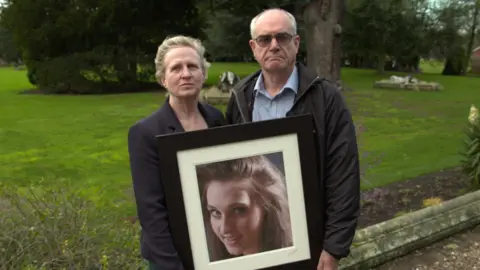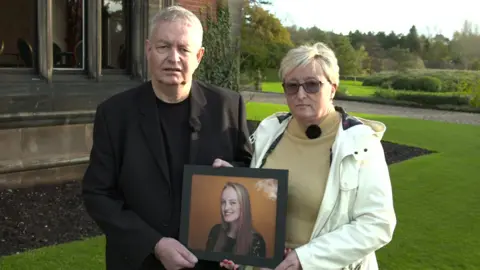Stalking super-complaint launched against police
 PA
PACampaigners have launched a super-complaint against the police over their approach to stalking.
The National Stalking Consortium has claimed officers are failing to identify offenders, properly investigate crimes or protect victims.
Only 5% of stalking cases in England and Wales result in a charge, it added.
Clive Ruggles, whose daughter Alice was killed by an ex-boyfriend who stalked her, said better training was needed so officers could "do the right thing".
A BBC Breakfast Freedom of Information request found that four police forces in England, out of 28 who responded, do not have a single point of contact for stalking, despite a government recommendation.
Some 14 forces who responded had gone above the minimum requirement and have more than one.
The super-complaint, a mechanism that allows organisations to highlight harmful patterns or trends in policing, is being brought 10 years on from a change to the law that made stalking a specific offence.
The consortium, made up of 21 expert individuals and organisations, argues that police are failing to identify patterns of behaviour and often treat incidents as lower level crimes such as malicious communications or criminal damage.
Campaigners have said they are "highly concerned" that reports of stalking are not properly investigated with officers incorrectly believing there is not enough evidence, and that stalking protection orders are not used enough.
Suky Bhaker, CEO of the Suzy Lamplugh Trust that set up the consortium, said a significant number of stalking victims are being let down by the police and courts "at every step of their journey to justice".
"Failure to identify and investigate stalking at the earliest possible opportunity results in an increasing risk of physical and psychological harm to the victim," she said.
She added that she hoped the super-complaint would lead to recommendations being brought in to improve the police response to stalking.
Once the super-complaint is submitted a watchdog will decide whether it is eligible for investigation.
'Prevalent... horrendous'
Alice Ruggles, 24, was killed by her soldier ex-boyfriend, Trimaan Dhillon, after he broke into her flat and cut her throat in Gateshead in 2016.
A review conducted after her death found Northumbria Police and the Army failed to properly address signs of L/Cpl Dhillon's jealous and obsessive behaviour.
Alice's father, Clive Ruggles, told BBC Breakfast he believed her concerns were listened to by some in the force but said he thought there was poor training in place.
"I think she was listened to by some of the police there and the first responder [who] came round was really, really doing his utmost to help," he said.
"He was totally empathetic, but he was poorly trained."

He added that there needed to be better training in place for police officers to spot the signs of stalking, as well as a change in mindset of how dangerous stalking can be.
"Stalking is so prevalent, it's just horrendous," he said.
"We've got to have police training that means they do the right thing when they spot a stalking case, follow it up in the right way.
"We need multi-agency support, much better support for multi-agency working because it's not just about the criminal justice response.
"You've got to raise a generation who are shocked when they see stalking in the news. I think too many people still think of stalking as a bit of a joke - or something that happens to other people."

Richard Spinks, whose daughter Gracie was stabbed by a former colleague who stalked her in Derbyshire in 2021, told the BBC that victims have "got to believe in the system" in order for them to come forward.
He said: "You shouldn't be afraid of coming forward and complaining and making a report with the mindset of 'If I do, nothing will be done - they won't take it seriously enough, and there won't be any action.'
"It's got to be all the constabularies, all the police forces in the country have got to have the same procedures in place, the same coordinators, advocates...that are trained to deal with these complaints and reports and investigate them.
"I think that was a lot to do with the problem with Gracie that the report wasn't investigated enough."
Deputy Chief Constable Paul Mills, who is the National Police Chiefs' Council lead for stalking and harassment, said there was more to do to improve outcomes for victims of stalking.
"It is recognised there is more to do to improve the criminal justice system outcomes for victims of stalking and we are working closely with the Crown Prosecution Service to understand the progression of cases before the point of charge and court," he said.
Police in England and Wales issued more than 400 stalking protection orders in 2020 and expect the number to increase.
The number of stalking crimes recorded by forces has also risen, which chiefs claim is due to improved awareness of offending behaviour.
The Suzy Lamplugh Trust is named after Ms Lamplugh, an estate agent who went missing in south west London in 1986.
